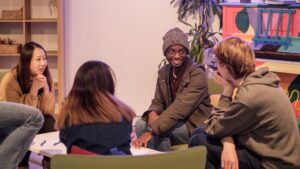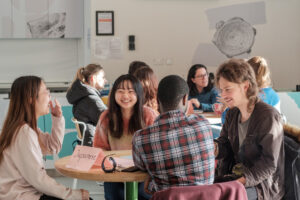In my latest blog, I am delighted to share some reflections from a recent conversation I had with students and staff about the vibrant language learning community here at the University. Our discussion highlighted the incredible enthusiasm and dedication that both students and staff bring to our language programmes and initiatives.

Language PAL (Peer Assisted Learning)
One of the standout aspects of our language offerings is the Language PAL scheme, a brilliant example of SU-University collaboration. This initiative is a testament to the power of peer-to-peer learning. Students who are passionate about languages volunteer to lead sessions, helping their peers improve their language skills in a relaxed and supportive environment.
Janvi Mahtani Balani, a Senior PAL Leader, shared her experiences from both a PAL attendee and a leader perspective. She emphasised how the sessions are tailored to the needs of the participants, making learning fun and pressure-free. Whether it's practising conversation for an upcoming holiday or diving into grammar, the sessions are flexible and responsive to student needs. Janvi also highlighted the rewarding nature of being a PAL leader, noting the joy of seeing others develop a love for languages.
Vienne Hiu Yi Lin, another Senior PAL Leader, echoed these sentiments, adding that supporting others with a language enhances communication skills and provides valuable teaching experience. The role of Senior PAL Leaders in supporting new Leaders and ensuring the smooth running of sessions was also emphasised, showcasing the collaborative spirit of the scheme.
Jovana Cuxac, Senior PAL leader and third-year psychology student, also shared her insights on the benefits of participating in, and leading, PAL sessions. She emphasised how being a PAL leader and attending language sessions has benefited her CV and interview experiences. Jovana noted that she could talk about the skills gained in applications and interviews, which has helped her gain other opportunities. Her experience highlights the practical advantages of engaging in peer support and student leader activities, both in terms of personal growth and employability.
Language Café: A Cultural Melting Pot
The Language Café is another fantastic collaborative initiative that brings together students and staff to celebrate linguistic and cultural diversity. Carmen Schembri Wismayer, from the Skills Centre, and Astrid Forsyth, a Lecturer from PoLIS, started the Language Café three years ago and continue to coordinate it alongside the SU. Carmen described it as an opportunity for staff and students to connect over their shared love of languages. The Café runs three times a year and offers sessions in a variety of languages at different proficiency levels.

Astrid shared a delightful anecdote about the first Language Café, where the turnout exceeded all expectations. The Café has become a space where participants can immerse themselves in different languages, often discovering new aspects of their own personalities in the process. The inclusion this year of British Sign Language (BSL) sessions, in collaboration with disability services, is a testament to the inclusive nature of the Cafés.
Janvi also shared her experience of attending the Café to learn German. Despite initial nerves, she found the environment welcoming and supportive, allowing her to practice and improve her language skills in a fun and engaging way.
Language Courses: Enhancing Employability
The University’s language courses, provided by the Skills Centre, are designed not only to teach language skills but also to enhance employability. Claire Charlemagne, Head of Languages in the Skills Centre, discussed how the curriculum is tailored to develop skills for employability. By embedding employability skills within the courses, students are better equipped to articulate the value of their language skills in the job market.
They have also introduced globally recognised professional language qualifications, offering students the option to take exams that accredit their proficiency. Last year, they piloted German and French exams with great success, and this year have expanded this to all languages offered, with over 80 students entering for examination this year. This initiative provides students with additional credentials that can enhance their CVs and job prospects. Plus, staff can also access these courses with the same benefits!
Supporting International Students
In addition to our foreign language courses, we offer extensive support for international students through our English for Academic Purposes (EAP) programs. These include pre-sessional courses in the summer and in-sessional support throughout the academic year. Claire highlighted the success of our student-led cultural and social integration project, which helps international students feel welcome and supported as they adapt to life at Bath.
Cultural Events: Celebrating Diversity
Our commitment to celebrating cultural diversity is evident in the range of cultural events also organised by students and staff. From film evenings to quizzes and cultural celebrations like the Lantern Festival, these events provide opportunities for students to explore different cultures, make friends, and enjoy social activities. These events are an integral part of our efforts to create a welcoming and inclusive community.
Daisy Zhu, a Mandarin Language Lecturer from PoLIS, shared her perspective on the growth and development she has witnessed in students through PAL sessions, the Language Café, and wider cultural events on campus. She commented on how wonderful it is to see students grow in confidence, improve their skills, but also make connections with others in our community.
Conclusion (and notable achievements after our conversation!)
The conversation with students and staff was a wonderful reminder of the vibrant and supportive language learning community we have at Bath. The enthusiasm and dedication of everyone involved is truly inspiring.
At the recent Education Awards, I was especially pleased to see Janvi win the Outstanding Contribution to Peer Mentoring Award, as well as pick up a group award alongside Vienne, Jovana and others for Outstanding Contribution to Language Peer Assisted Learning – well done! It is great to see our students rewarded for volunteering and supporting others. I also want to highlight the recent announcement from the Skills Centre about the Global Language Summer School courses, offering an intensive learning experience, helping students and staff improve their skills in just 2, 5, or 10 days. Apply now (deadline: 23 May)!
Whether through the Language PAL scheme, the Language Café, our language courses, or our support for international students, thank you to everyone who contributes to making our language programmes such a success. Your passion and hard work are what make Bath a special place to learn and grow.
Special thanks to everyone who joined me for the chat about Languages: Annette Goddard (SU Skills & Development Manager), Carmen Schembri Wismayer (Languages Course Leader, Skills), Janvi Mahtani Balani (BSc (hons) Management with Marketing), Claire Charlemagne (Head of Languages, Skills), Astrid Forsyth (Lecturer, PoLIS), Daisy Zhu (Lecturer, PoLIS), Hiu Yi Lin (EdD Research in Education), and Jovana Cuxac (BSc (hons) Psychology).
Contact me directly at pro-vc-se@bath.ac.uk if you have a question or would like to suggest future topics for my blog.
Respond
